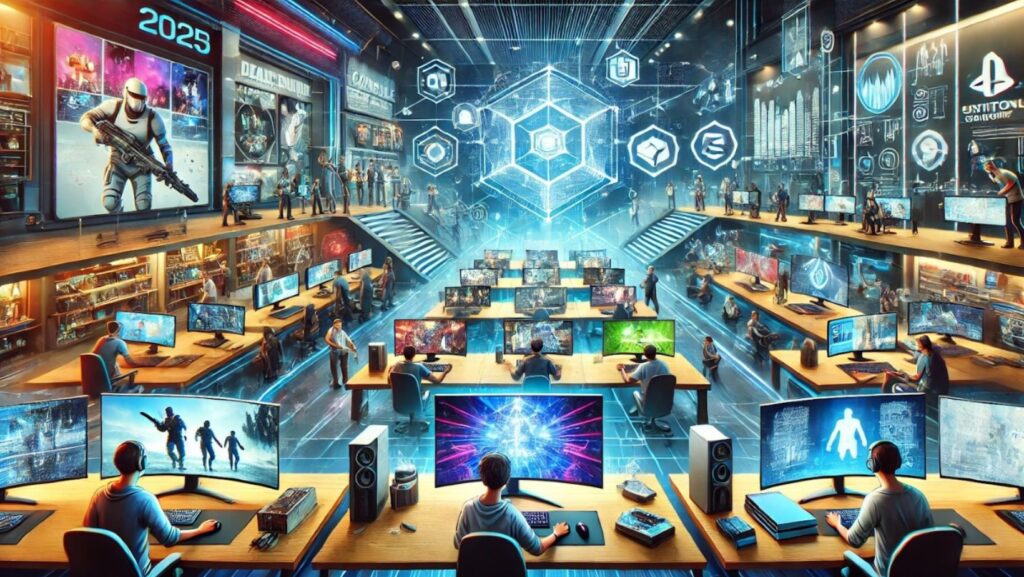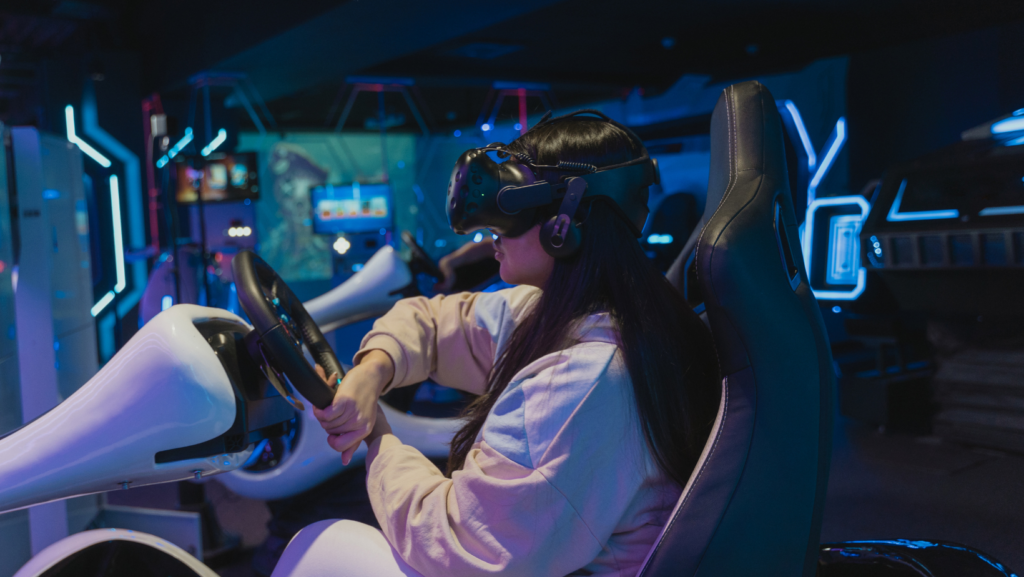The gaming industry is no stranger to continuous innovations and ever-evolving trends. With 2025, just around the corner, developers and gaming companies eagerly anticipate what new technologies or trends lie ahead of them. Comprehending these new game development trends will help you stay one step ahead and be the torchbearer in shaping the future of interactive games.
Cloud Gaming turns Mainstream
Cloud gaming technology is expected to be the mainstream in 2025. It will rule the industry, representing a paradigm shift in global access to high-quality gaming experiences.

This eradicates the requirement for expensive hardware, allowing users worldwide to play AAA titles online on Xbox Cloud Gaming and NVIDIA GeForce NOW. This trend in console game development particularly impacts regions where traditional gaming consoles have been financially out of reach and less accessible, thus creating new markets and expanding the player base.
VR/AR Take Center Stage
VR and VR are evolving from niche technologies to mainstream gaming experiences, which is great news. With more affordable VR headsets and innovative AR applications, game designs will turn out to be immersive experiences that are increasingly accessible, combining digital and physical spaces. Expect games in 2025 to simulate worlds and invite players to inhabit them truly, blending real-world interactions with digital landscapes.
AI Reshaping Game Development
Ai is changing game design as we know it today. It simplifies production processes by automating repetitive character creation or level generation tasks. The most exciting aspect of AI in game development is the realistic NPCs (Non-Playing Characters). With AI, these NPCs are responsive based on their environment and seem lifelike enough for users to interact naturally within a virtual world; this makes the narration richer than ever before. AI characters will understand the context and react dynamically. Creating realistic narrative experiences that feel natural.
Cross-Platform Connects Gamers
The days are long gone when gaming was limited to a single platform or device. Cross-platform games have inspired the way we play and connect online. It has opened up new prospects for gamers to connect, collaborate, and compete. This is predominantly true in multiplayer games, where players worldwide can unite virtually to achieve common goals while enjoying each other’s company. This trend breaks down the barriers that once separated people based on the location and platform that they used. This makes it easier for players to switch between devices without losing progress. Developers must now think beyond single-platform experiences, designing games that feel consistent and engaging regardless of the player’s chosen device.
Hardware Innovations with Next Gen Console
Next-generation gaming consoles employ advanced processors, improved graphics rendering capabilities, and high-capacity storage. This technology enables developers to construct larger, more detailed game environments and minimize load times. Competition among manufacturers like Sony and Nintendo ensures that it will drive continuous innovation, presenting developers with opportunities to create richer and more immersive gaming experiences.
Blockchain and Player-Driven Economies
Blockchain technology is introducing fascinating new economic models to gaming. Expansion is anticipated, with play-to-earn models empowering players to own and profit from their in-game assets by trading and monetizing digital accomplishments.

By 2025, gamers may trade or sell items in real-world markets, adding a financial dimension to gaming. While this trend shows promise, it also faces potential regulatory challenges, particularly concerning the environmental impacts of blockchain technologies. Companies exploring this space will need to navigate these complexities carefully.
Personalizing Player Journey
The future of gaming is deeply personal. Advanced adaptive storytelling techniques, which tailor narratives to player choices and behaviors, will create game experiences that are unique to the player. By analyzing player data, developers can craft stories, environments, and challenges that resonate personally, boosting engagement and satisfaction. This trend highlights the shift towards creating games uniquely tailored to each player.
Conclusion
The console gaming industry continues to develop rapidly, with technological refinements shaping its landscape. In 2025, we anticipate more experiential experiences defined through connectivity, personalization, and technological innovations. Companies that adopt these trends, remain versatile, and prioritize player experience will be in charge in this exciting new era of interactive entertainment.
Frequently Asked Questions
What Challenges do Developers Face with Cross-Platform Play?
The biggest challenge for developers concerning cross-platform play would be upholding a consistent and enjoyable gaming experience across all channels. This is because developers will have to ensure that the game runs smoothly on different operating systems and various gaming consoles, and each has its own unique hardware specifications and software requirements.
What Makes Cloud Gaming Significant for Console Development in 2025?
Cloud gaming lets players access high-quality games without expensive hardware, thus extending the gaming audience to regions where consoles are less common. It also reduces barriers for gamers who are new or inexperienced.
Are VR and AR Viable for Mainstream Gaming?
Yes, advancements in affordable VR headsets and AR innovations are making these technologies more accessible. They offer immersive gameplay experiences that blend digital and physical interactions, appealing to a wider audience.
What are the Challenges of Integrating Blockchain into Gaming?
Integrating blockchain can be complex due to technical limitations, regulatory hurdles, and environmental concerns. Developers planning to incorporate this technology must consider all aspects and challenges before proceeding with their projects.



